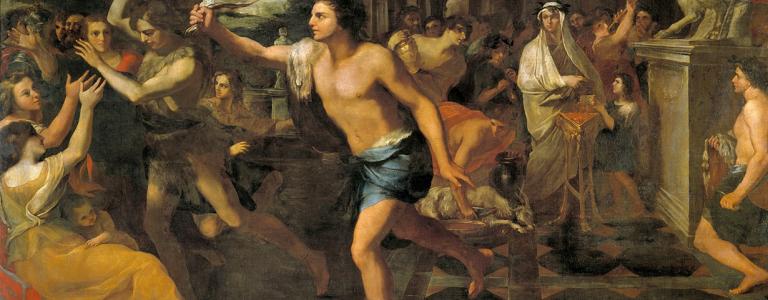News
Is Valentine’s Day a Pagan Holiday? Debunking the Myths
Valentine’s Day History:
Valentine’s Day, as we know it today, has a fascinating and complex history that spans centuries. Its roots can be traced back to ancient Roman times, where it was initially celebrated as Lupercalia, a fertility festival held on February 15th. During Lupercalia, the festivities involved various rituals, one of which was men drawing names of women from a jar.

These pairs were then expected to spend the duration of the festival together, often leading to romantic relationships and even marriages. This aspect of matchmaking is often cited as an early precursor to the modern Valentine’s Day, as it involved the exchange of tokens of affection, not dissimilar to the cards and gifts we exchange today.
Saint Valentine:
The association between Valentine’s Day and Saint Valentine, a Christian martyr, emerged during the Middle Ages, further shaping the holiday’s identity. While the exact details of Saint Valentine’s life remain shrouded in historical ambiguity, several legends surround his story. The most popular legend suggests that Saint Valentine was a priest who performed secret marriages for Roman soldiers during a time when Emperor Claudius II had prohibited marriage for young men, believing that single soldiers made better warriors.

Saint Valentine defied the emperor’s orders and continued to conduct these clandestine unions in the name of love. Eventually, he was captured, imprisoned, and subsequently martyred on February 14th. This courageous act of love and defiance is why Valentine’s Day is celebrated on this date and why Saint Valentine has become the patron saint of lovers.
Is Valentine’s Day a Pagan Holiday?
The early association between Valentine’s Day and the pagan festival of Lupercalia is undeniable. Lupercalia, celebrated on February 15th, was indeed a fertility festival steeped in ancient Roman paganism. However, it’s crucial to recognize that the holiday has undergone a profound transformation over the centuries. With the Christianization of the Roman Empire, there came a shift in the way Valentine’s Day was observed.

The Church sought to Christianize existing pagan festivals by integrating them with Christian traditions. In this process, the commemoration of Saint Valentine and the emphasis on love and affection gradually replaced the more explicit pagan aspects of Lupercalia. While some remnants of its pagan history persist, Valentine’s Day, as it stands today, is more a celebration of love and companionship than a pagan festival.
Modern Celebration:
Today, Valentine’s Day has transcended its historical roots and is celebrated as a secular holiday by people from diverse faiths and backgrounds all around the world. It has become a universal occasion to express love, appreciation, and affection to partners, family members, and friends. This expression often takes the form of exchanging gifts, heartfelt cards, and romantic gestures.

While the holiday’s origins may be intertwined with pagan customs, its contemporary significance lies in fostering love, strengthening bonds, and cherishing the relationships that enrich our lives. In this modern celebration of Valentine’s Day, the focus is firmly placed on love and companionship, making it a cherished and widely embraced holiday for people of all backgrounds.
In summary, the question of whether Valentine’s Day is a pagan holiday depends on how you view its historical origins. While it does have some ties to the Roman festival of Lupercalia, it has evolved over the centuries into a celebration of love and affection, with a strong association with Saint Valentine and Christian traditions. Today, Valentine’s Day is a time to express love and appreciation for the special people in our lives, regardless of its historical roots.

